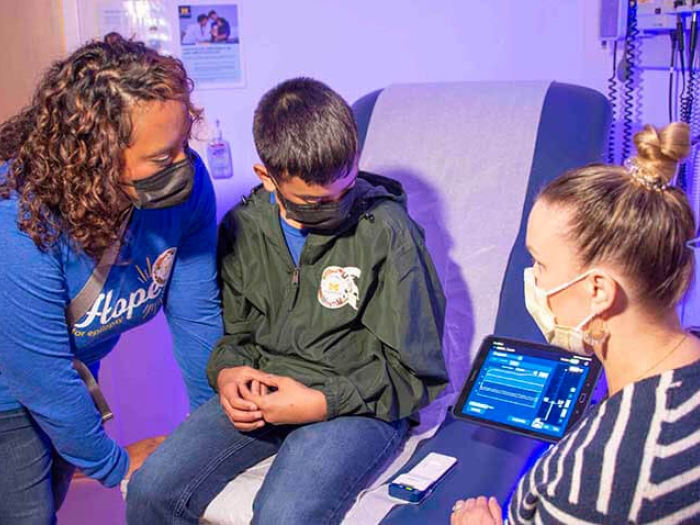It sounds like a comic book condition. But XMEN disease can be life-threatening, which is why early detection was key for one Michigan family.
1:00 PM
Author |
Jenni Sachs remembers the urgent phone call from nearly three years ago.
Results from her 9-month-old son Ethan's blood tests were back: His white blood cell count was alarmingly high, and he needed to go to the emergency room right away.
SEE ALSO: Four Miraculous Kids, One First-Grade Classroom
One word repeatedly crossed her mind: leukemia.
But further testing ruled out cancer as the cause of the toddler's reoccurring infections, sickness and abnormally high number of white blood cells. It took advanced testing — including whole exome genetic tests — at University of Michigan's C.S. Mott Children's Hospital for Ethan to be diagnosed with a condition even most doctors don't know: XMEN disease.
Ethan was only the 14th known case of the immune disorder in the world. More tests led to the diagnosis of the 15th documented case — his older brother, Lucas.
"When I tell people my sons have XMEN disease, they think of the [comic book] characters. I always say, 'Yes, Ethan and Lucas are my little superheroes,'" Jenni says.
This genetic defect was only identified a few years ago, so we are still learning about it, and there are probably more patients who have it that we are not aware of.Kelly Walkovich, M.D.
What is XMEN?
Discovered just five years ago, XMEN disease, which stands for X-linked immunodeficiency with magnesium defect, Epstein-Barr virus infection and neoplasia, is a rare, inherited genetic defect in the X chromosome that affects mostly males. It is marked by a flawed immune system and magnesium deficiency, making it difficult to fight off infections, including the common cold. As Lucas tells friends, "I have bad blood, and that's why I get sick."
Through genetic testing at the hematology-oncology clinic at C.S. Mott Children's Hospital, Jenni and her husband, Ryan, learned that Jenni is a carrier for the defect, and both sons inherited it. Ethan and Lucas are the second known pair of brothers to have the disease.
XMEN patients often require regular IVIG infusions (intravenous immunoglobulin), which involve purified plasma pooled from thousands of blood donors. Just before turning 1, Ethan began getting the infusions to give him antibodies his own body couldn't produce but needed to stay healthy. Now 3 years old, Ethan gets IVIG every four weeks. Lucas, 8, is often at his side getting tests, and he, too, will start the infusions soon.
The greatest threat for the brothers is the Epstein-Barr virus that tends to cause mono and could trigger life-threatening lymphoma to develop. Studies show that about 90 percent of people will be exposed to this virus by the time they're 30. Although it remains dormant in some XMEN patients, others may not be able to fully fight it.
The family recently met with the doctors who discovered XMEN disease at the National Institutes of Health in Maryland, hoping to get the boys into a clinical trial that would allow a new type of magnesium treatment used to combat the Epstein-Barr virus.
What the future holds
"This genetic defect was only identified a few years ago, so we are still learning about it, and there are probably more patients who have it that we are not aware of," says pediatric hematologist Kelly Walkovich, M.D., who has been treating the boys at the Mott clinic since their diagnosis nearly two years ago.
SEE ALSO: What Science Says About Letting Your Baby 'Cry It Out'
"We don't yet understand long-term outcomes for patients with XMEN disease, but luckily we were able to recognize and begin treating the disease early for Ethan and Lucas. Hopefully with early intervention and supplements and awareness of the risks, they can overcome the defect to boost their immune systems and live normal lives. They are already more healthy and robust than when they first got here, and we expect them to continue on that path."
The Sachses say they already notice a difference in their sons. The boys are going on nearly four months without needing antibiotics due to reoccurring infections — a record stretch. Ethan starts preschool in fall, and Lucas just finished baseball season.
"This is the kind of disease that could easily fly under the radar because so few people know about it and the symptoms are similar to other things. But early detection is key. If not for the advanced testing here at Mott, we could still be searching for answers about what's wrong," Jenni says.
"We are so relieved that Ethan and Lucas were diagnosed early, so we can do what we need to do to protect them from life-threatening infections. We're definitely in the best place, and they are getting the best care possible. The boys are running around and healthier than they've ever been. We just take it one day at a time."

Explore a variety of healthcare news & stories by visiting the Health Lab home page for more articles.

Department of Communication at Michigan Medicine
Want top health & research news weekly? Sign up for Health Lab’s newsletters today!





